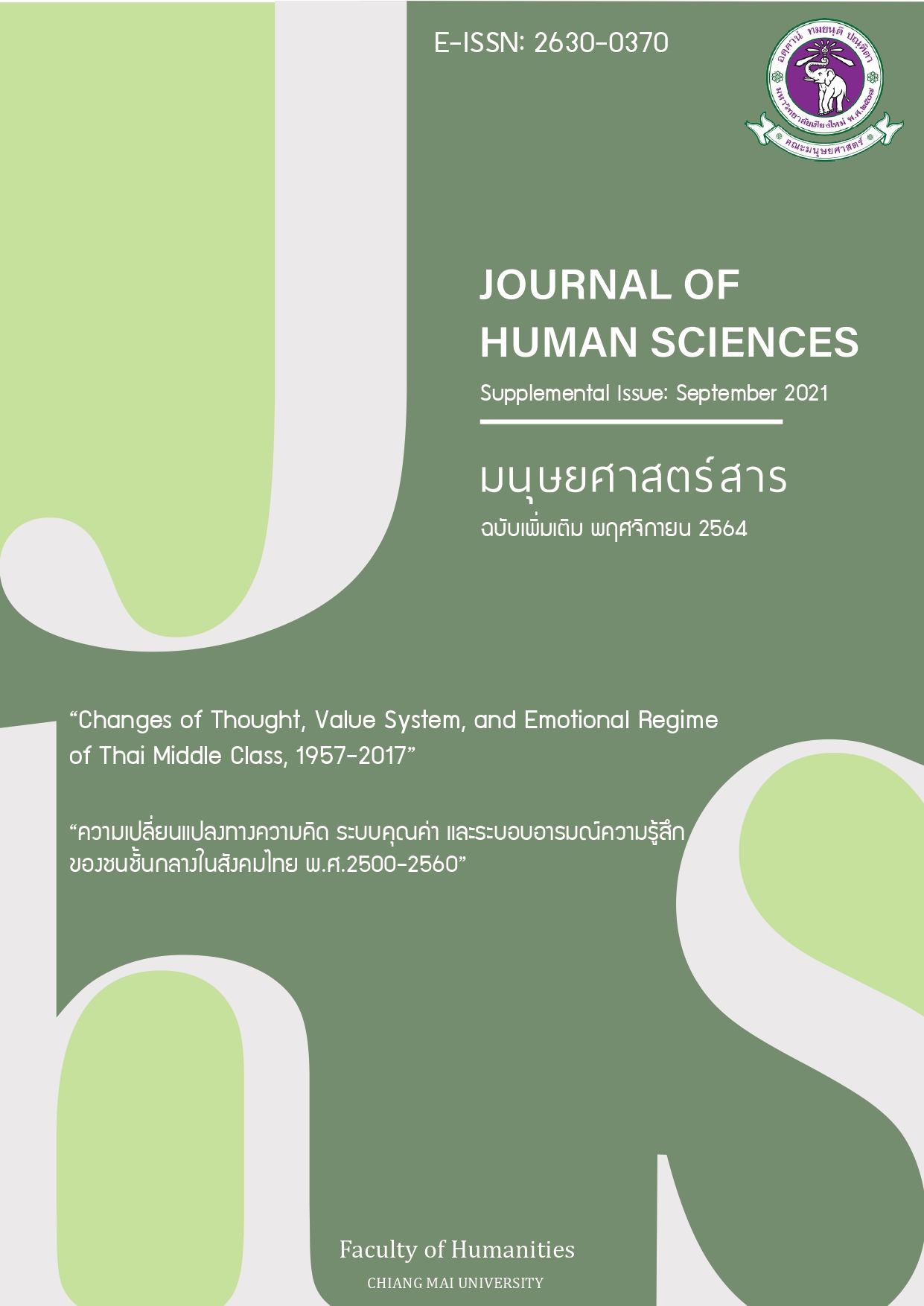จาก คึกฤทธิ์ ปราโมช ถึง พุทธทาสภิกขุ: อิทธิพลของประกาศกบุคคล ต่อจริตและอารมณ์ความรู้สึกชาวพุทธชนชั้นกลางไทย
Main Article Content
บทคัดย่อ
บทความนี้มีวัตถุประสงค์ที่จะวิเคราะห์บทบาทของประกาศกบุคคลที่มีอิทธิพลต่อความคิด และอารมณ์ความรู้สึกด้านพุทธศาสนาของชนชั้นกลางไทย โดยหยิบยกกรณี ม.ร.ว.คึกฤทธิ์ ปราโมช กับ พุทธทาสภิกขุผลการศึกษาพบว่าทัศนะของประกาศกทั้งสอง มีส่วนต่อการประกอบสร้างอารมณ์ความรู้สึกหรือจริตเรื่อง “แท้”-“เทียม” “แก่น”-“เปลือก” โดยที่อารมณ์ความรู้สึกนี้เป็นทั้งต้นทาง กระบวนการ และการผลิตซ้ำของวาทกรรม “พุทธแท้”- “พุทธเทียม” ที่ฝังลึกอยู่ในโครงสร้างระบอบอารมณ์ความรู้สึก ของชาวพุทธชนชั้นกลางไทยโดยเฉพาะกลุ่มที่ค่อนไปทางปัญญาชน นอกจากจริตเรื่องความ“แท้”-“เทียม” แล้ว ทัศนะ “วิทยาศาสตร์นิยม” และ “อำนาจนิยม” ก็เป็นสิ่งที่เห็นได้ชัดเจนจากประกาศกทั้งสองเช่นกัน โดยเฉพาะอย่างยิ่ง “อำนาจนิยม” ที่เป็นเครื่องมือในการชี้ผิดถูกและกำราบสิ่งที่ถูกมองว่า “ไม่แท้” “ของเทียม” หรือเปลือกพุทธศาสนา ด้วยอิทธิพลและพุทธโลกทัศน์ที่มีผลต่อชาวพุทธชนชั้นกลางไทยดังกล่าว จึงอาจตั้งข้อมสมมติฐานได้ว่า พุทธศาสนาชนชั้นกลางไทยโสตหนึ่งนั้นมีลักษณะที่ขัดแย้งกับอุดมการณ์ “เสรีนิยมประชาธิปไตย”
อันเป็นอุดมคติของชนชั้นกลาง
Article Details
เอกสารอ้างอิง
Buangsuang, W. (2013). kan khlưanwai thang khwamkhit khong Phutthathat Phikkhu kap kanmưang Thai Pho.So. songphanharoisiphok - songphanharoisamsiphok [The Movement of Bhuddhadasa Bhikkhu’s Thought and Thai Politics 1973 – 1993]. Department of History Faculty of Liberal Arts Thammasat University.
Chansongseang, W. (2006). mokkhaphalaram: aram anpen kamlang pen kamlang hæng khwam lutphon [Mokkhaphalaram: Monastery of liberation]. Sarakadee, 22(225). 98-109.
Chatkul N Ayuttaya, S. (1998). chiwit næokhit læ kan tosu khong narin klưng rư narin phasit khon khwang lok [The life, concept and struggle of Narin Pasit]. Bangkok: Matichon.
Chiangkul, W. (1995). sưksa botbat læ khwamkhit Mo.Ro.Wo. khưk rit Pramot [Studying Roles and ideas MR Kukrit Pramoj] Bangkok: Mingmit.
Chuangsakun, S. (1993). khwam plianplæng khong khana song sưksa korani thammayutiknikai Pho.So. 2368 – 2464 [Changes of the clergy A case study of thammayut doctrine, 1825-1921]. Journal of Letters, 25(1-2). 44-73.
Bhuddhadasa Bhikkhu (1992). chumnum pathokkatha chut phut tham [Total lectures series of Buddhadham]. Bangkok: Sukkhaphapjai.
Dangda, P. (2013). wiwatha rawang Mo.Ro.Wo. khưk rit Pramot kap Phutthathat Phikkhu [Debate between MR Kukrit Pramoj and Bhuddhadasa Bhikkhu]. Bangkok: Dokya.
Eaosriwong, N. (1993). watthanatham khong chon chan klang Thai [Culture of the Thai middle class]. Journal of Thammasat, 19(1). 31-41.
Eaosriwong, N. (2002). kon yuk phrase ari waduai satsana khwam chưa læ sinlatham [Before the era of Phra Sri Ari] Bangkok: Matichon.
Feungfusakul, A. (1993). Buddhist Reform Movements in Contemporary Thai Urban Context: Thammkai and Santi Asok. (Ph.D. Thesis, Bielefeld University)
Jackson, Peter A. (2003). Buddhadasa Theravada Buddhism and Modernist Reform in Thailand. Chiangmai: Silkworm Book.
Kittiarsa, P (2005). Farang as Siamese Occidentalism, Asian Research Institute Working Paper no 49. Singapore: Asian Research Institute.
Klinsunthon, J. (1990) sangkhom Thai ko khong rao katho sangkhom Thai [Thai society is ours Shocking Thai society] Bangkok: Siamrat.
Kongsamut, S. (2017). tam roi tham panya nantha phikkhu banthưk chiwit læ nathi chetsiphok pi hæng kan prakat phut tham [Follow the footsteps of wisdom Nanthaphikkhu life and role 76 years of evangelism] Bangkok: Thammasapha.
Kumpha, A. (2020). khosangket waduai phut satsana chon chan klang Thai amnat hæng kam læ mano that sin ha : chak rakthan su prakottakan ruamsamai [Observations on Buddhism in the Thai middle class, The power of karma and The Concept of the 5 precepts: From origin to contemporary phenomenon] Journal of Human Sciences, Faculty of Humanities, Chiang Mai University, 21(3). 237-256.
Likhitkul, S. (2003). nailuang kap khưk rit [King and Kukrit] Bangkok: Sappasat.
Nartchamnong, T. (2012). klin phra [Smelly to the monks] Bangkok: Dokya.
Nittayaramphong, S. (2004). pum prawattisat Mahidon phưa prachathipatai phak song prasan prachachon uthit ton phưa udomkan (sipsi Tulakhom songphanharoisiphok-hok Tulakhom 2519) [Mahidol History Almanac for Democracy, Part 2] Bangkok: Mahidol History Almanac for Democracy Committee.
Potjanalawan, P. (2013). wihan mai wangplao prawattisat chabap yo khong phut satsana hua kaona lang sipsi tula Pho.So. songphanharoisiphok - songphanharoisisipʻet [Temple that is not empty, Short history of Progressive Buddhism after October 14, 1973-1998]. Fhadiaokan, 11(3). 139-179.
Potjanalawan, P. (2017). chitniyom-prawattisat rưang lao chœng lilap kap udomkhati phut satsana bæp Thai chuang thotsawat songphanharoi - songphanharoiyisip [“Idealism-History”: An attempt to explain mysterious narratives by the ideals of Thai Buddhism 1960-1980]. Journal of Social Sciences Naresuan University, 13(2). 41-63.
Pramoj, K. (2005). phut satsana kap khưk rit [Buddhism and Kukrit]. Bangkok: Dokya.
Puntharikwiwat, T. (1997). Phutthathat Phikkhu nai boribot khong sangkhom Thai [Bhuddhadasa Bhikkhu in the context of Thai society]. Buddhist Studies, (May-August). 84-104.
Sattayanurak, S. (2007). khưk rit kap praditthakam khwampen Thai lem song [Khukrit and The Thai invention Vol 2] Bangkok: Mathichon.
Sivaraksa, S. (2006). khanchong song phra [Monks mirror]. Bangkok: Moral Promotion Association of Tekka Chichinko.
Srinara, T. (2012). khwamkhit thangkan mưang khong panyachon fai khan phailang kan toktam khong krasækhwam khit sangkhomniyom nai prathet Thai Pho.So. songphanharoiyisipsi - songphanharoisamsipsi [Political thoughts of the opposition intellectuals after the decline of the socialist ideology in thailand, 1981–1991]. (Ph.D. Thesis, Chulalongkorn University).
Thampramot (2006). tam roi phut that phak chiwit [Follow in the footsteps of Bhuddhadasa Bhikkhu Sector of life]. Bangkok: Thammasapha.
Thongkhambanchong, C. (2018). songsai mai thammautthathat chabap thammaæ kæ plưak [Do you wonder? The real Dharma of Bhuddhadasa Bhikkhu]. Bangkok: A Think Book.
Wasi, P. (1987). suan mok thammakai santi asok [Three monasteries of contemporary Thai Buddhism]. Bangkok: Bangkok: mo chaoban.
Wongkul, P. (2002). phut wibat wikrit satsana nai yuk thanathiptai [Disastrous of Buddhism in the period of Commercial world]. Bangkok: Withithat Project.
Worawanno, P. (2017). phut mai la yom [Buddhist, Yom?]. Bangkok: Wara.
Watcharawasi, W, ed (2016). pathok katha phiset rưang wikrit nai phra phut satsana doi phon tri Mo.Ro.Wo. khưk rit Pramot [Crisis in Buddhism, keynote speech by MR Kukrit Pramoj]. Bangkok: Wasi Creation.


